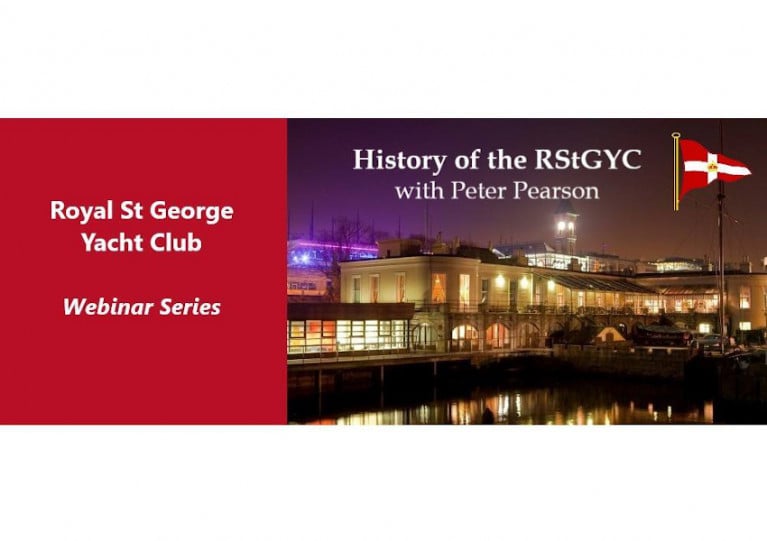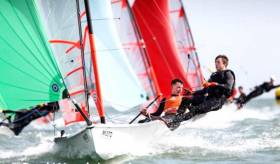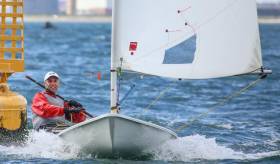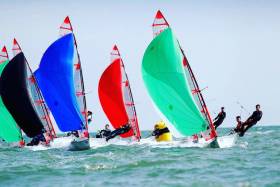Displaying items by tag: Royal St George
Ireland Medals at the ILCA 7 World Masters: Colin Leonard Wins Silver, Mark Lyttle Bronze
Irish sailors held their nerve over the final two back-to-back races on Saturday to win ILCA 7 silver and bronze at the World Masters Championships in Adelaide, Australia.
Irish champion Colin Leonard of Ballyholme Yacht Club in Northern Ireland won silver in the ILCA 7 Apprentice fleet (age 30 to 44) after a consistent series saw the Belfast Lough sailor finish the 12 race series with a string of second place scores ((2.0 [6.0] 2.0 2.0 1.0 6.0 2.0 2.0 2.0 2.0 6.0 2.0) against overall winner Luke Deegan of New Zealand in a 12 boat fleet.
In the ILCA 7 Great Grand Masters division (age 55 to 64), 1996 Olympian Mark Lyttle of the National Yacht Club on Dublin Bay won bronze in his 35-boat fleet.
 The National Yacht Club's Mark Lyttle won bronze at the ILCA 7 Great Grand Masters World Championship fleet in Adelaide, Australia Photo: Jack Fletcher
The National Yacht Club's Mark Lyttle won bronze at the ILCA 7 Great Grand Masters World Championship fleet in Adelaide, Australia Photo: Jack Fletcher
The 1996 Atlanta Olympian, who won the Grand Master title in 2018 on home waters, finished on 46 points and third overall, six points off silver won by New Zealand's Andrew Dellabarca.
With an incredible 11 race wins from 12 starts, Australia's Brett Beyer proved unstoppable in this fleet.
Belfast Lough's Conrad Simpson, competing in the same division, finished 29th but withdrew after race seven due to injury.
 Royal St. George's Sean Craig of Dun Laoghaire Harbour competing on day five in the ILCA 6 Grand Masters World Championships in Adelaide, Australia Credit: Jack Fletcher
Royal St. George's Sean Craig of Dun Laoghaire Harbour competing on day five in the ILCA 6 Grand Masters World Championships in Adelaide, Australia Credit: Jack Fletcher
Royal St. George's Sean Craig of Dun Laoghaire Harbour finished sixth overall in the ILCA 6 Grand Masters category.
Scroll down the results sheet (below) to read the final scores.
Final Two Races To Decide If Ireland Will Medal at the ILCA/Laser World Masters Championships
Two final back-to-back races on Saturday will decide if Ireland will be on the podium in the ILCA/Laser World Masters Championships in Adelaide, Australia, with Irish boats contesting medal places in two divisions.
In the ILCA 7 Great Grand Masters 35 boat fleet,1996 Olympian Mark Lyttle of the National Yacht Club lies third in Adelaide, Australia, after ten races sailed.
The 1996 Atlanta Olympian, who won the Grand Master title in 2018 on home waters, is on 27 points and third overall, five points off second held by New Zealand's Andrew Dellabarca.
With an incredible nine race wins from ten starts, Australia's Brett Beyer is unstoppable on nine points in this fleet.
Belfast Lough's Conrad Simpson, competing in the same division, is 25th.
 Irish sailors are performing well in both ILCA 6 and 7 divisions at the 2024 ILCA World Masters Championships, Australia Photo Jack Fletcher
Irish sailors are performing well in both ILCA 6 and 7 divisions at the 2024 ILCA World Masters Championships, Australia Photo Jack Fletcher
In the 12-boat ILCA 7 Apprentice fleet, Ireland's Colin Leonard of Ballyholme Yacht Club continues a consistent run in second overall.
In the ILCA 6, Royal St. George's Sean Craig of Dun Laoghaire Harbour lies sixth overall up one place from Thursday's seventh in the ILCA 6 Grand Masters category after ten races sailed but just four points off fifth.
The Irish champion took an early lead in last Sunday's opening two races, scoring two fourths, but is now on 54 points after ten races sailed, some 38 points off the lead held by Australia's Mark Tonner-Joyce.
Robert Jeffreys of Australia, who spends half his year in Cork Harbour and sails out of Monkstown and Royal Cork, dropped to sixth from fourth place in the ILCA6 Great Grand Masters division.
The competition concludes on Saturday (February 10th) with two final back-to-back races.
Scroll down the results sheet (below) to read the latest scores.
Irish Sailors Eyeing Two Podium Finishes at ILCA World Masters Championships, Australia
Ireland's assault on the ILCA/Laser World Masters Championships in Adelaide, Australia, continues into the penultimate day of competition, with Irish boats in podium places in two divisions.
In the ILCA 7 Great Grand Masters 35 boat fleet,1996 Olympian Mark Lyttle of Dun Laoghaire lies third in Adelaide, Australia, after eight races sailed.
The 1996 Atlanta Olympian, who won the Grand Master title in 2018 on home waters, is on 27 points and third overall, five points off second held by New Zealand's Andrew Dellabarca.
With seven race wins from eight starts, Australia's Brett Beyer appears unstoppable on seven points in this fleet.
Belfast Lough's Conrad Simpson, competing in the same division, is 25th.
 Irish sailors are performing well in both ILCA 6 and 7 divisions at the 2024 ILCA World Masters Championships, Australia Photo Jack Fletcher
Irish sailors are performing well in both ILCA 6 and 7 divisions at the 2024 ILCA World Masters Championships, Australia Photo Jack Fletcher
In the 12-boat ILCA 7 Apprentice fleet, Ireland's Colin Leonard of Ballyholme Yacht Club continues in second overall.
In the ILCA 6, Royal St. George's Sean Craig of Dun Laoghaire Harbour lies seventh in the ILCA 6 Grand Masters category after seven races sailed but just two points off fifth.
The Irish champion took an early lead in last Sunday's opening two races, scoring two fourths, but is now on 42 points after seven races sailed, some 29 points off the lead held by Australia's Mark Tonner-Joyce.
Robert Jeffreys of Australia, who spends half his year in Cork Harbour and sails out of Monkstown and Royal Cork, continues in fourth place in the ILCA6 Great Grand Masters division.
The competition continues until Saturday, February 10th.
Scroll down the results sheet (below) to read the latest scores.
National Yacht Club's Mark Lyttle Moves Up to Fourth at ILCA 7 Great Grand Masters, Australia
In the ILCA 7 Great Grand Masters 35 boat fleet,1996 Olympian Mark Lyttle of Dun Laoghaire lies fifth in Adelaide, Australia after six races sailed.
The 1996 Atlanta Olympian, who won the Grand Master title in 2018 on home waters, counts 4 (12) 4 5 2 4 to be on the same 19 points as third overall, Christoph Marsano of Austria.
With five races wins from six starts, Australia's Brett Beyer appears unstoppable on five points in this fleet.
Belfast Lough's Conrad Simpson, competing in the same division, is 21st.
In the 12-boat ILCA 7 Apprentice fleet, Ireland's Colin Leonard of Ballyholme Yacht Club continues in second overall.
 Royal St. George's Sean Craig of Dun Laoghaire Harbour competing in the ILCA 6 Grand Masters World Championships in in Adelaide, Australia Photo: Jack Fletcher
Royal St. George's Sean Craig of Dun Laoghaire Harbour competing in the ILCA 6 Grand Masters World Championships in in Adelaide, Australia Photo: Jack Fletcher
Royal St. George's Sean Craig of Dun Laoghaire Harbour continues in fifth in the ILCA 6 Grand Masters category.
The Irish champion took an early lead in Sunday's opening two races, scoring two fourths, but is now on 287 points after six races sailed, some 18 points off the lead held by Australia's Mark Tonner-Joyce.
Robert Jeffreys of Australia, who spends half his year in Cork Harbour and sails out of Monkstown and Royal Cork, is in fourth in the ILCA6 Great Grand Masters division.
The competition continues until next Saturday, February 10th.
Scroll down the results sheet (below) to read the latest scores.
Royal St. George's Sean Craig Drops to Fifth in ILCA 6 Grand Masters World Championship
Royal St. George's Sean Craig of Dun Laoghaire Harbour has lost the overall lead in the ILCA 6 World Championships Grand Masters Fleet in Adelaide, Australia.
The Irish champion took an early lead in Sunday's opening two races, scoring two fourths, but a four and discarded nine scored on Monday has dropped the sole Irish contender to fifth overall on 12 points.
Australia's Mark Tonner-Joyce leads on seven points from America's Andrew Holdsworth on eight, with Australian Bruce Savage third on 11.
 Ballyholme Yacht Club's Colin Leonard in action in the Apprentice division of the ILCA 7 World Championships in Adelaide, Australia
Ballyholme Yacht Club's Colin Leonard in action in the Apprentice division of the ILCA 7 World Championships in Adelaide, Australia
Lyttle Lying Fifth in ILCA 7 Great Grand Masters
In the ILCA 7 Great Grand Masters 35 boat fleet,1996 Olympian Mark Lyttle of Dun Laoghaire lies fifth, and Belfast Lough's Conrad Simpson is 18th.
The competition continues until next Saturday, February 10th.
In the 12-boat ILCA 7 Apprentice fleet, Ireland's Colin Leonard of Ballyholme Yacht Club lies second.
Scroll down the results sheet (below) to read the latest scores.
The Royal St George Yacht Club in conjunction with Leinster Colleges and Schools are commencing a new team racing league to be held over three Saturdays in March and April.
The ethos behind the league is to provide youth sailors with a more regular schedule of racing in between their clinics, which in turn will enhance their team racing skills and sailing experiences.
It will provide an opportunity to hopefully encourage teenagers to remain in sailing and perhaps assist clubs in expanding their junior sailing programmes.
As part of the league, coaching is permitted between racing at the changeover area to enable competitors to improve on their team tactics.
The races will be umpired and at the end of racing there will be a debrief regarding calls made on the water and an explanation of the rules.
As there is a limited number of Irish Sailing-accredited umpires, the league will also provide opportunities for those that have completed the Local Umpires course to gain on-the-water experience.
The Royal St George hopes that by providing these opportunities, it will whet the appetite for people to come forward to qualify as Umpires and go forward to attaining Regional or National status. Anyone interested is invited to contact Eunice Kennedy at [email protected].
Going forward, plans are in place to roll out this type of event in the other provinces for five to eight racing days between autumn and spring in order to enhance the experience of college and school team racing programmes.
The debut league will race on 11 March, 25 March and 1 April. The Notice of Race and entry form are available HERE.
Royal St George Yacht Club members are invited to join Peter Pearson as he takes a journey back in time with an engaging talk about the history of the Dun Laoghaire Waterfront club.
Peter is a native of Dun Laoghaire and has had a long association with the town and harbour, producing well-known local history books such as Dun Laoghaire: Kingstown and The Forty Foot: A Monument to Sea Bathing.
The special online talk will be hosted on the Zoom platform this Thursday evening 18 June from 7.30pm. Club members can register via the link on the Facebook post HERE.
Royal St. George Host 29er Skiff Try–Outs This Weekend
The Royal St. George Yacht Club in Dun Laoghaire will host try-out sessions in the 29er youth skiff class this coming weekend.
There'll be one hour try–out slots available with experienced 29er sailors on hand to assist. There will also be land based information along with coaching and rigging sessions.
As Afloat.ie previously reported, the Royal St. George YC has been touting the idea of a new challenge for youth sailors for some time.
Ireland has some success in the 29er, most recently thanks to the exploits of Harry Durcan and Harry Crosbie of Royal Cork Yacht Club who became bronze medalists at the British UK youth sailing championships last April. Durcan has now teamed up with Royal St. George's own Tom Higgins to continue the campaign.
'There seems to be a lot of interest and we are hoping that building the class will help keep sailors in the sport at a time when all clubs are challenged to keep their ‘youths’, explains Royal St.George Yacht Club sailing manager, Ronan Adams.
This weekend's sailing sessions are from 10am to 4pm. If you want to get a spin, sign-up here is required.
Former Irish Sailing President Roger Bannon believes the class has a lot of potential previously posting the following comment of Afloat.ie's Facebook page: 'The 29er is a perfect youth sailors boat which regardless of the development path opportunities can provide the fun factor so deperately missing in Ireland for aspiring young sailors. The ISA has a poor track record in identifying and supporting development boats for young people so let the youngsters and the market make the real decision'.
Top Ten for Royal St. George's Craig at Laser Radial Master Worlds
Royal St. George's Sean Craig finished tenth at the Laser Masters World Championships in Split, Croatia. The Dublin Radial competitor is counting the cost of a U flag after he finished fifth in race four in his 37–boat division which meant he had to count a 17h place in his score tally. Craig ended the regatta with a solid third place today.
The regatta lost three fully days due to light winds, only getting seven races in six days. The hope is that winds will blow a little stronger when the Laser World Master Championships come to Dublin Bay next September.
The Irish team competed in two divisions. Results are downloadable below.
Royal Cork's Nick Walsh was 24th overall from 69 in the Mens Standard division, Theo Lyttle was 35th and Ed Rice was 53rd. Paul Keane was 58th and Kevin Currier was 59th.
New 29er Fleet for Dun Laoghaire? Royal St. George Seeks Interested Youth Sailors for Skiff Venture
The Royal St. George Yacht Club in Dun Laoghaire, County Dublin is seeking youth sailors 'looking for a new challenge'.
RStGYC Sailing Manager Ronan Adams says a group of sailors are looking to form a 29'er fleet in Dun Laoghaire. The RStGYC has put a shout out to to see 'if anyone else might be open to a discussion as to the merits of this double hander class'
While Adams acknowledges 'the 29er is not supported/ recognised by the ISA as a pathway class', he says 'it most certainly does have its merits internationally' and also is a draw as ‘cool’ and fast/ fun boat for the age group mid-teens/ youths who sail it.
The Royal St. George's Tom Higgins has launched a new 29er campaign with Royal Cork's Harry Durcan as Afloat.ie reported previously.
One possible draw back is that the learning curve is very steep, vertical nearly but those that stick with it will be rewarded. Good second hand boats are in the region of €5k and are available in the UK, according to Adams.
RStGYC currently has two interested families and at least one in another waterfront Club in Dun Laoghaire who would like to meet other interested parties to discuss.
Expressions of interest or suggestions on whom to pass on the information are encouraged. The plan is to put all interested parties in touch with one another through email and see what happens.
email: [email protected] who are aiming to hold a meeting on Sept 10th or 17th. and have your say on Afloat's Facebook page. Here's what others have been saying:

































































